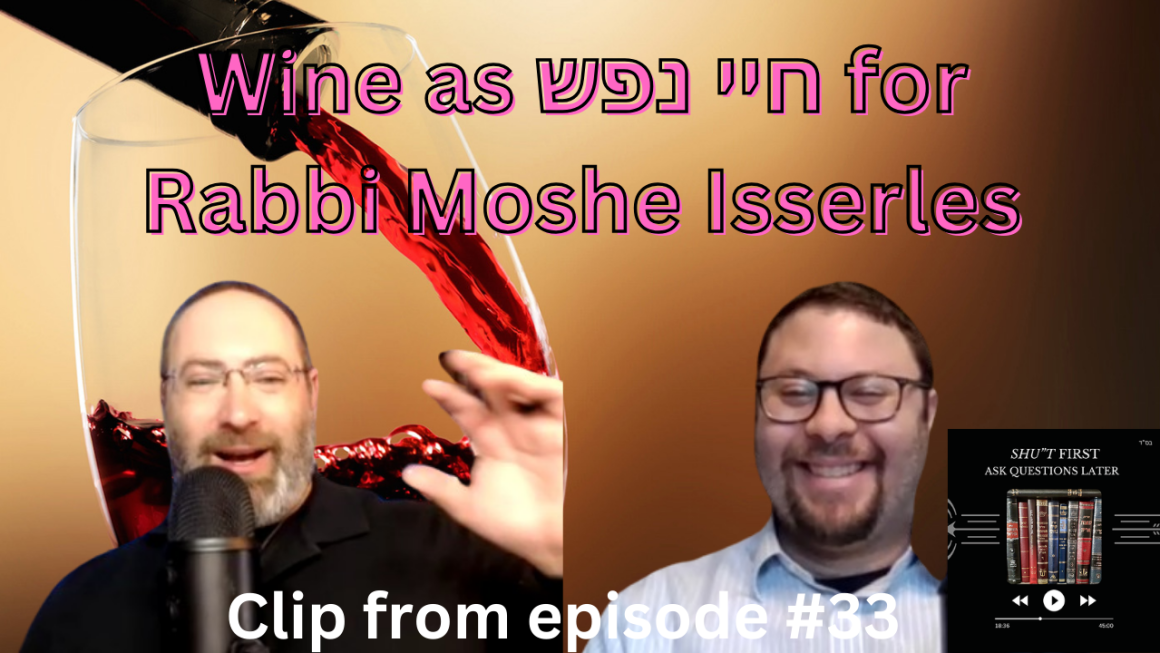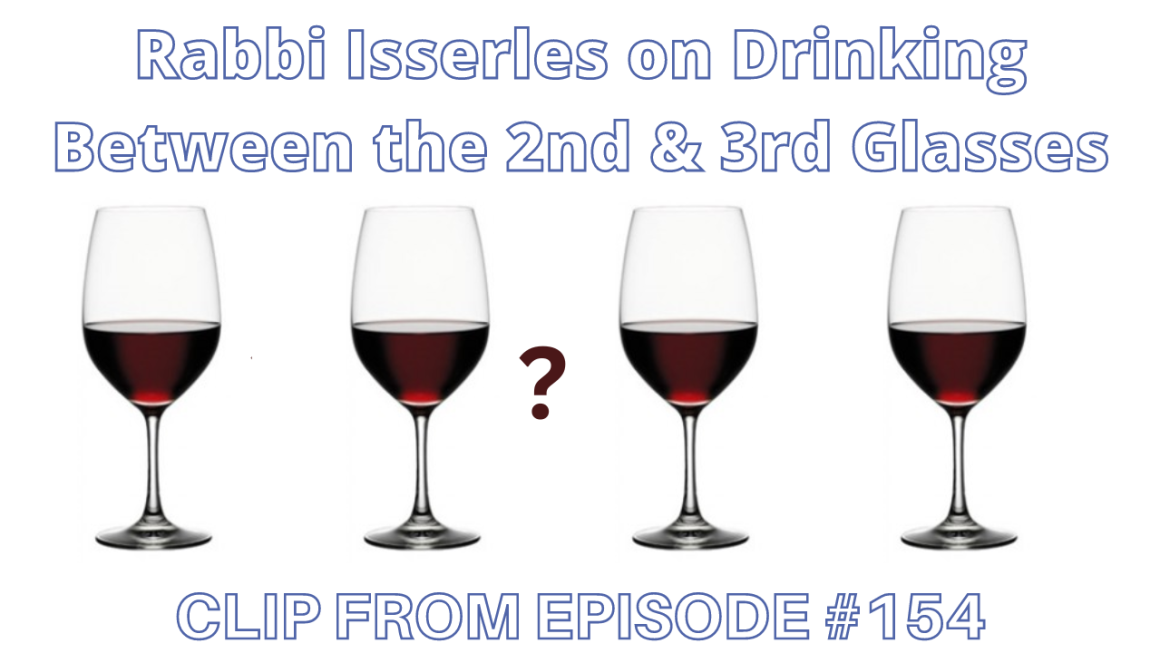Introduction: Appearances
Wine appears in four statements in Avot – three dealing with wine as a vehicle for metaphors and one dealing with wine in a literal sense.
Temporal Appropriateness
Rabbi Dosa, son of Hyrcanus (while the Hebrew literally transliterates to Harkinas, it would seem that it is a variant of Hyrcanus)[1] warns against wine-drinking in the afternoon (Avot 3:10):
רַבִּי דוֹסָא בֶן הַרְכִּינַס אוֹמֵר, שֵׁנָה שֶׁל שַׁחֲרִית, וְיַיִן שֶׁל צָהֳרַיִם, וְשִׂיחַת הַיְלָדִים, וִישִׁיבַת בָּתֵּי כְנֵסִיּוֹת שֶׁל עַמֵּי הָאָרֶץ, מוֹצִיאִין אֶת הָאָדָם מִן הָעוֹלָם
Rabbi Dosa ben Hyrcanus says: “Morning sleep, afternoon wine, children’s talk, and sitting in the assemblies of the ignorant take a man out of the world.”
Rabbi Dosa, son of Hyrcanus, has no problem with wine-drinking, per se, in this text. Just as with sleep encroaching into the morning, beyond the night,[2] wine-drinking as early as the afternoon, instead of confining it to the evening and night reduces one’s productive activity time from the day (in this respect, his statement seems to draw from the wisdom of Proverbs in its approach to using the daytime for productive activity and not sleeping). In other words, afternoon drinking “will have further social and economic consequences, and can ultimately shorten life.”[3]
It is worth noting that Rabbi Dosa, son of Hyrcanus, is not saying that drinking wine in the afternoon is even a bad thing; merely that it takes one out of this world. It almost seems as if this is not only an observation he is making, but an observation from his own experience.[4]
Wine as Metaphor
Moving to the metaphorical use of wine in Avot, we see it being used to describe learning from Torah scholars (Avot 4:20):
רַבִּי יוֹסֵי בַר יְהוּדָה אִישׁ כְּפַר הַבַּבְלִי אוֹמֵר, הַלּוֹמֵד מִן הַקְּטַנִּים לְמַה הוּא דוֹמֶה, לְאֹכֵל עֲנָבִים קֵהוֹת וְשׁוֹתֶה יַיִן מִגִּתּוֹ. וְהַלּוֹמֵד מִן הַזְּקֵנִים לְמַה הוּא דוֹמֶה, לְאֹכֵל עֲנָבִים בְּשֵׁלוֹת וְשׁוֹתֶה יַיִן יָשָׁן.
Rabbi Yose, son of Yehudah, a leader of the Babylonian Village, says: “He who learns from children, to what is he compared? To one who eats unripe grapes, and drinks wine from his vat; And he who learns from the old, to what is he compared? To one who eats ripe grapes, and drinks old wine.”
Rabbi Yose, son of Yehudah, a leader of the Babylonian Village, describes learning from people as if they were wine: the younger they are, the less developed they are; the older they are, the more developed they are, providing further character and refinement. When it comes to looking for a teacher, “it is better to find a teacher who is older, because the teacher’s wisdom grows from studying over the years and from the cumulative wisdom bestowed by life’s experiences.”[5]
While this provides a fairly straightforward model comparing wisdom of the teacher to the quality of the agedness of wine, there is a weakness involved in this comparison, which gets pointed out by Rabbi Meir in the very next text (Avot 4:20):
רַבִּי מֵאִיר אוֹמֵר, אַל תִּסְתַּכֵּל בַּקַּנְקַן, אֶלָּא בְמַה שֶּׁיֶּשׁ בּוֹ. יֵשׁ קַנְקַן חָדָשׁ מָלֵא יָשָׁן, וְיָשָׁן שֶׁאֲפִלּוּ חָדָשׁ אֵין בּוֹ
Rabbi Meir[6] says: “Don’t look at the wine cask, but at that which is in it: there is a new cask full of old wine, and an old cask in which there is not even new wine.”
While Rabbi Meir fundamentally agrees that aged wine is better (and, so, too, experienced Torah), he points out that there are older people who know less Torah, while there are younger people who know more Torah. Just as wine is not found in the wild, flowing, but is confined to containers, so, too, is Torah to be found within and from people, and not just floating about.
An intriguing way of describing this is that there are younger men who have good questions and wisdom and are unmixed with doubts, like old wine whose lees have been removed from them, and there are elders who are devoid of wisdom and whatever wisdom they may possess is mixed-up and confused.[7]
A fourth and final occurrence of wine in Avot occurs as another metaphor (Avot 5.15):
אַרְבַּע מִדּוֹת בְּיוֹשְׁבִים לִפְנֵי חֲכָמִים: סְפוֹג, וּמַשְׁפֵּךְ, מְשַׁמֶּרֶת, וְנָפָה
סְפוֹג, שֶׁהוּא סוֹפֵג אֶת הַכֹּל.
מַשְׁפֵּךְ, שֶׁמַּכְנִיס בְּזוֹ וּמוֹצִיא בְזוֹ
מְשַׁמֶּרֶת, שֶׁמּוֹצִיאָה אֶת הַיַּיִן וְקוֹלֶטֶת אֶת הַשְּׁמָרִים
וְנָפָה, שֶׁמּוֹצִיאָה אֶת הַקֶּמַח וְקוֹלֶטֶת אֶת הַסֹּלֶתThere are four types among those who sit before the sages: a sponge, a funnel, a strainer, and a sieve.
A sponge soaks up everything;
A funnel takes in at one end and lets out at the other;
A strainer which lets out the wine and retains the lees;
A sieve, which lets out the coarse meal and retains the choice flour.
Here, the metaphor has less to do with wine, per se, than it does to do with describing the student who lets out the good stuff (wine) and keeps the not good stuff (lees).
In other words, the strainer “improves the teaching by passing on the wine while holding back the dregs.”[8]
In these three instances, wine is used for its metaphorical uses, likely due its commonplace aspect in the culture.
Conclusions
Wine is largely used in Pirkei Avot for its metaphorical aspects, likely due to how commonly-occurring it was in the culture. In half of its occurrences, Torah is likened to wine, perhaps due to both its potency and enjoyability, as well as its improvement with age. Wine-drinking in the afternoon is described as something which removes one from the world, even if it is something that takes place on a regular basis. In sum, wine is part of the world of the sages and is an enjoyable aspect of it.
[1] Daniel Machiela, “A Brief History of the Second Temple Period Name ‘Hyrcanus’”, Journal of Jewish Studies, vol. LXI, No. 1 (Spring 2010), 136.
[2] For a brief discussion on morning sleep, see my “Rabbinic Sleep Ethics: Jewish Sleep Conduct in Late Antiquity”, Milin Havivin, vol. 2 (2006), 89-90.
[3] Rabbi Irving (Yitz) Greenberg, Sage Advice: Pirkei Avot with Translation and Commentary (New Milford, CT & Jerusalem: Maggid Books, 2016), 134.
[4] This is furthermore interesting, considering the incident recorded on Pesahim 100a, in which we hear of Rabban Shimon ben Gamliel, Rabbi Yehudah, and Rabbi Yose dining on a Friday afternoon, which would necessarily have had wine-drinking involved, so we see that the sages would, at least on occasion, drink wine during the afternoon.
[5] Greenberg, Sage Advice, 226.
[6] It would seem that Rabbi Meir is commonly witnessed as speaking this statement, while others show Rabbi [Yehudah HaNasi] (and there are even versions that record Rabbi Yose). See Shimon Sharvit, מסכת אבות לדורותיה: מהדורה מדעית, מבואות ונספחים (Jerusalem: Bialik Institute, 2004), 172.
[7] Rambam, commentary on Avot 4:20.
[8] Greenberg, Sage Advice, 269.




One thought on “Wine in Pirkei Avot”